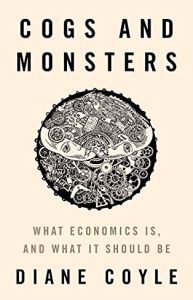Зарегистрируйтесь на getAbstract, чтобы получить доступ к этому краткому изложению.

Зарегистрируйтесь на getAbstract, чтобы получить доступ к этому краткому изложению.
Diane Coyle
Cogs and Monsters
What Economics Is, and What It Should Be
Princeton UP, 2021
Что внутри?
The digital age is shaping the future direction of economics.
Recommendation
In a book brimming with insights and expertise, professor Diane Coyle offers a wide-ranging overview of the current state of economics, a field that has come under fierce fire in recent years. Coyle disputes many of the straw-man criticisms without being polemical, but she does call for a rethinking of some of the assumptions on which the science is based that have had adverse societal impacts. Her work on the digital economy, in particular, provides nuanced conclusions on how to measure, regulate and manage it. Analysts and executives will find this a valuable look at the modern economy.
Summary
About the Author
Diane Coyle is a professor of public policy at the University of Cambridge. Her previous books include Markets, States, and People; GDP: A Brief but Affectionate History; and The Economics of Enough.

























Comment on this summary